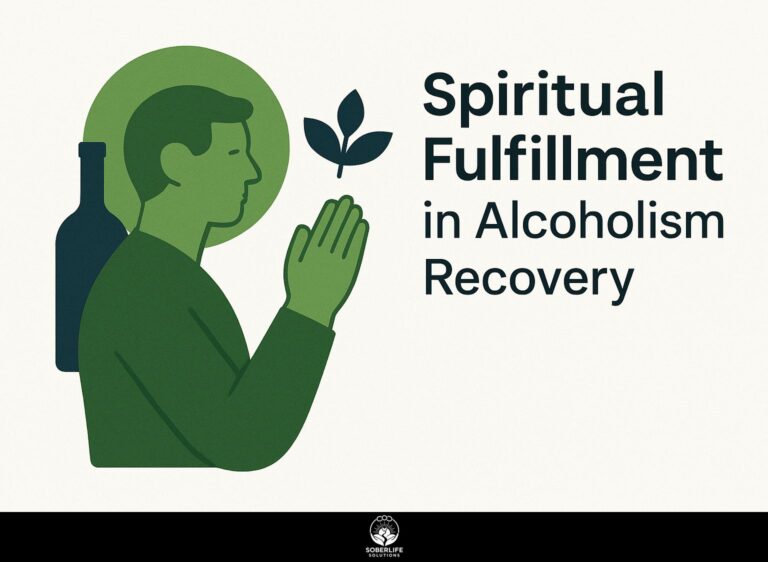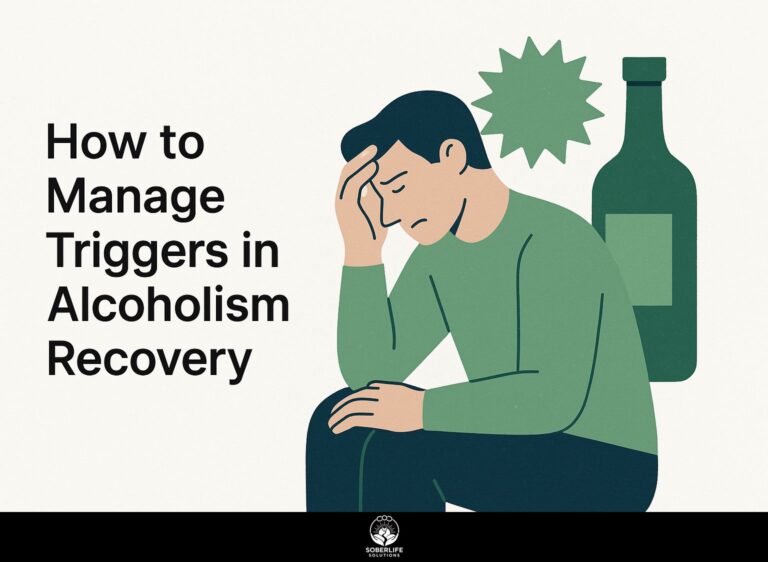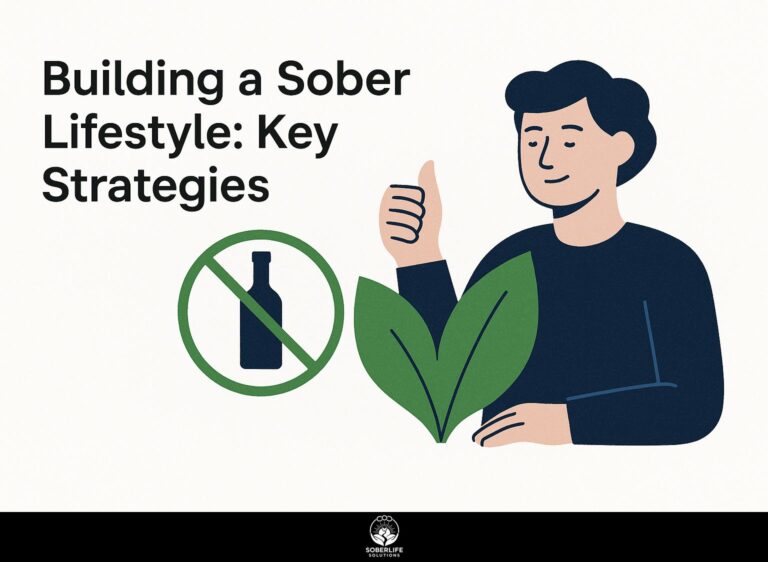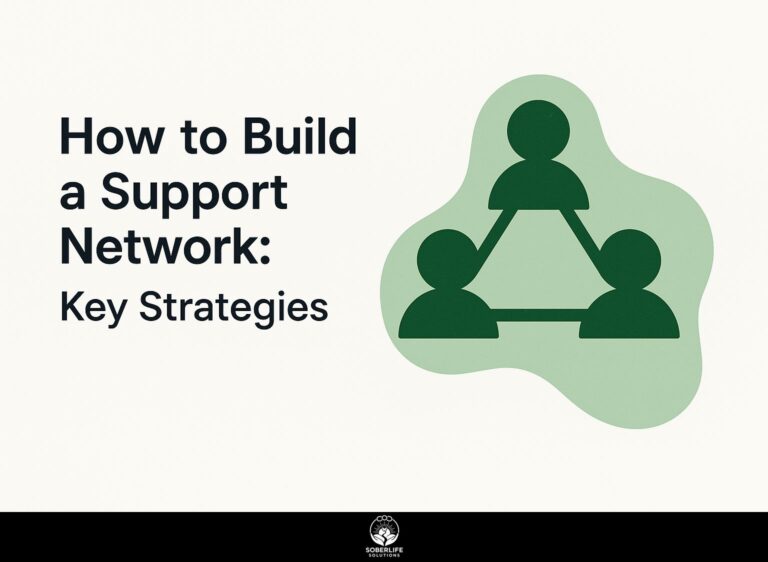Changing Habits in Recovery: Eating and Lifestyle
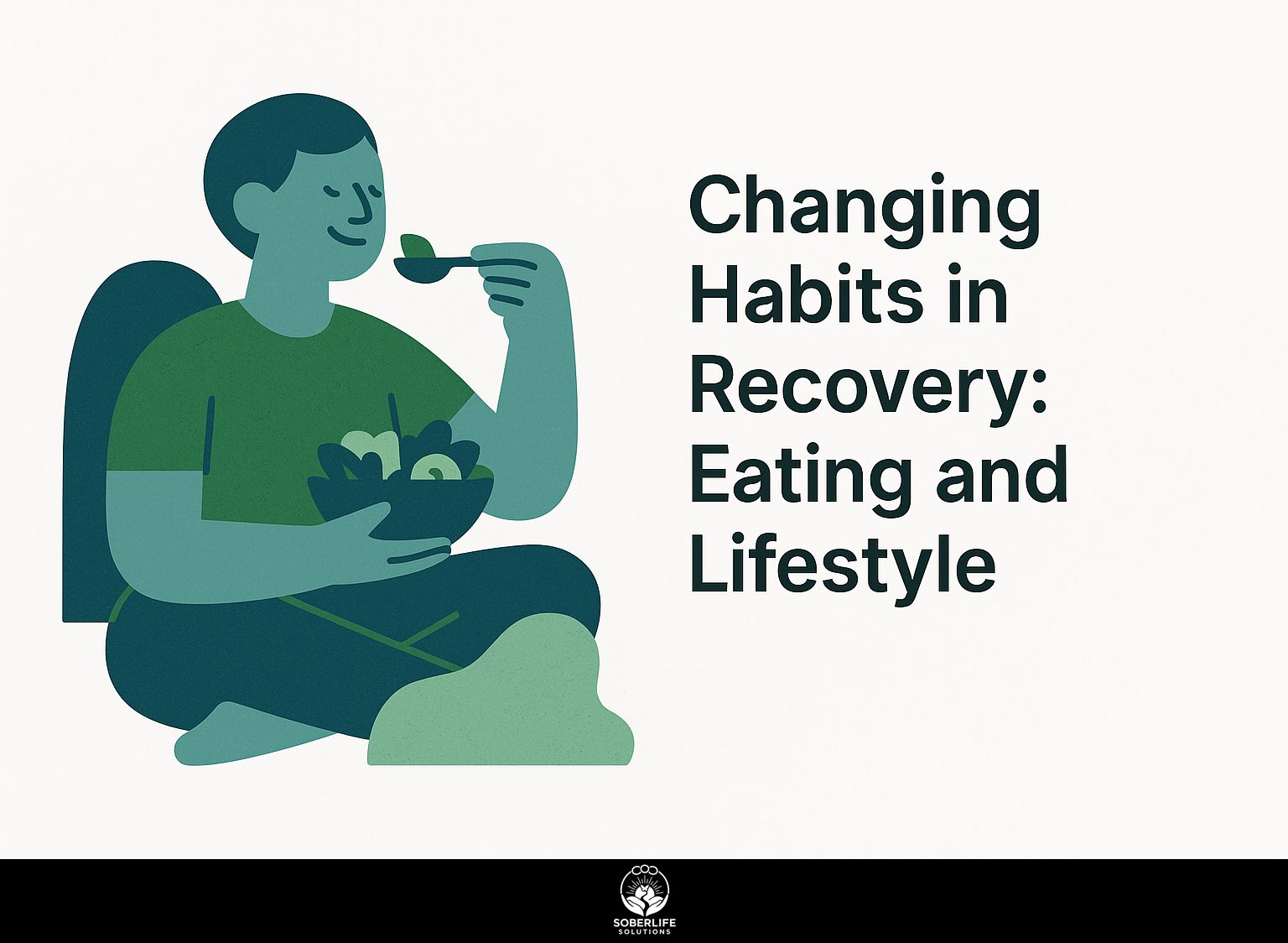
Long-term changes in recovery can greatly improve your life, particularly when dealing with issues related to drugs, alcohol, and eating disorders. Nutrition is important for recovery, aiding the body in healing from the effects of opioids and other substances. This article explains how to build good eating habits and make changes in your daily routine that help you move towards better health. It gives practical tips and ideas for living healthier.
Key Takeaways:
The Importance of Habit Change
Studies indicate that forming new habits can cut relapse rates by up to 60%, highlighting the importance of changing habits during recovery. This is further explored in an article from ScienceDirect, where the process of habit formation and change is examined in detail.
To effectively change habits, start by creating specific, measurable, achievable, relevant, and time-bound goals. Make sure they are clear, measurable, realistic, important, and have a deadline. For example, instead of saying “I want to exercise more,” say “I will jog for 20 minutes every morning at 7 AM.”
Next, put the Habit Loop into action: pick a trigger (such as getting out of bed), set a habit (like going for a jog), and give yourself a reward (such as eating a nutritious breakfast).
Track progress using apps like Habitica or Streaks, which gamify habit tracking and provide motivation. Many people have successfully reduced cravings by consistently applying these strategies.
Overview of Eating and Lifestyle Factors
Nutrition and lifestyle choices are important for recovery, with studies showing that balanced diets can improve recovery by 30%.
A high-fiber diet, rich in fruits, vegetables, and whole grains, helps reduce cravings by promoting satiety. Drinking enough water is important; being just 1% dehydrated can impact your thinking and mood. Aim for at least 8 cups of water daily.
Balanced meals, incorporating proteins, healthy fats, and complex carbohydrates, support metabolic function and stabilize blood sugar levels. For instance, a study showed that participants who consumed balanced meals reported 25% fewer energy crashes. Understanding how nutrition therapy can be integrated into alcoholism recovery (explored in our detailed guide) provides further insights into optimizing recovery.
Together, these parts support a complete method for recovery.
Understanding Nutrition in Recovery
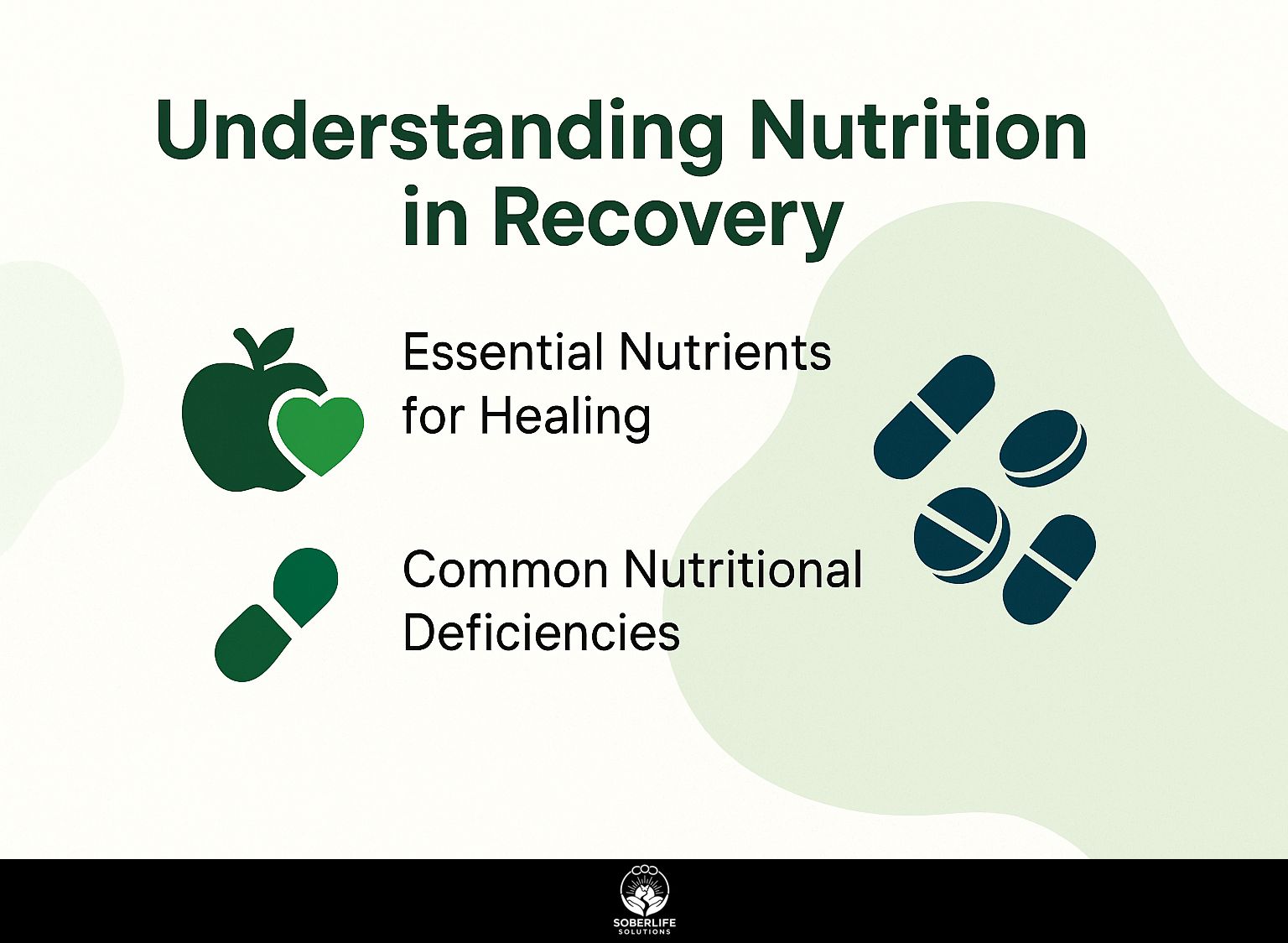
Nutrition plays a key role in recovery. Eating the right nutrients can help reduce withdrawal symptoms and improve how organs work, resulting in better health. Learn more about how nutrition therapy can be effectively integrated into alcoholism recovery to maximize these benefits.
Essential Nutrients for Healing
Key nutrients such as omega-3 fatty acids, B vitamins, and magnesium are essential for healing during recovery, with specific amounts recommended based on individual needs.
To support recovery effectively, consider incorporating foods rich in these nutrients.
- For omega-3s, aim for fatty fish like salmon or supplements providing 1,000 mg daily.
- You can get B vitamins from whole grains, leafy greens, and a B-complex supplement to increase energy levels.
- For magnesium, nuts, seeds, and beans are beneficial, with an intake of around 400 mg daily.
Including these foods in your diet can greatly help your recovery.
Common Nutritional Deficiencies
Many individuals in recovery face nutritional deficiencies that can hinder their progress, with up to 75% experiencing vitamin D or calcium deficiency.
To address these common deficiencies, consider incorporating specific foods and supplements into your diet.
For vitamin D, fatty fish like salmon and fortified dairy products are excellent choices. According to the World Health Organization, food fortification can be a key strategy to combat deficiency.
You can increase calcium intake by eating leafy greens like kale and drinking plant-based milks that have added nutrients. Protein needs can be met through lean meats, eggs, or legumes, which support muscle repair.
If food sources are insufficient, a daily multivitamin or specific supplements can help, but always consult a healthcare professional before starting any new regimen.
Developing Healthy Eating Habits
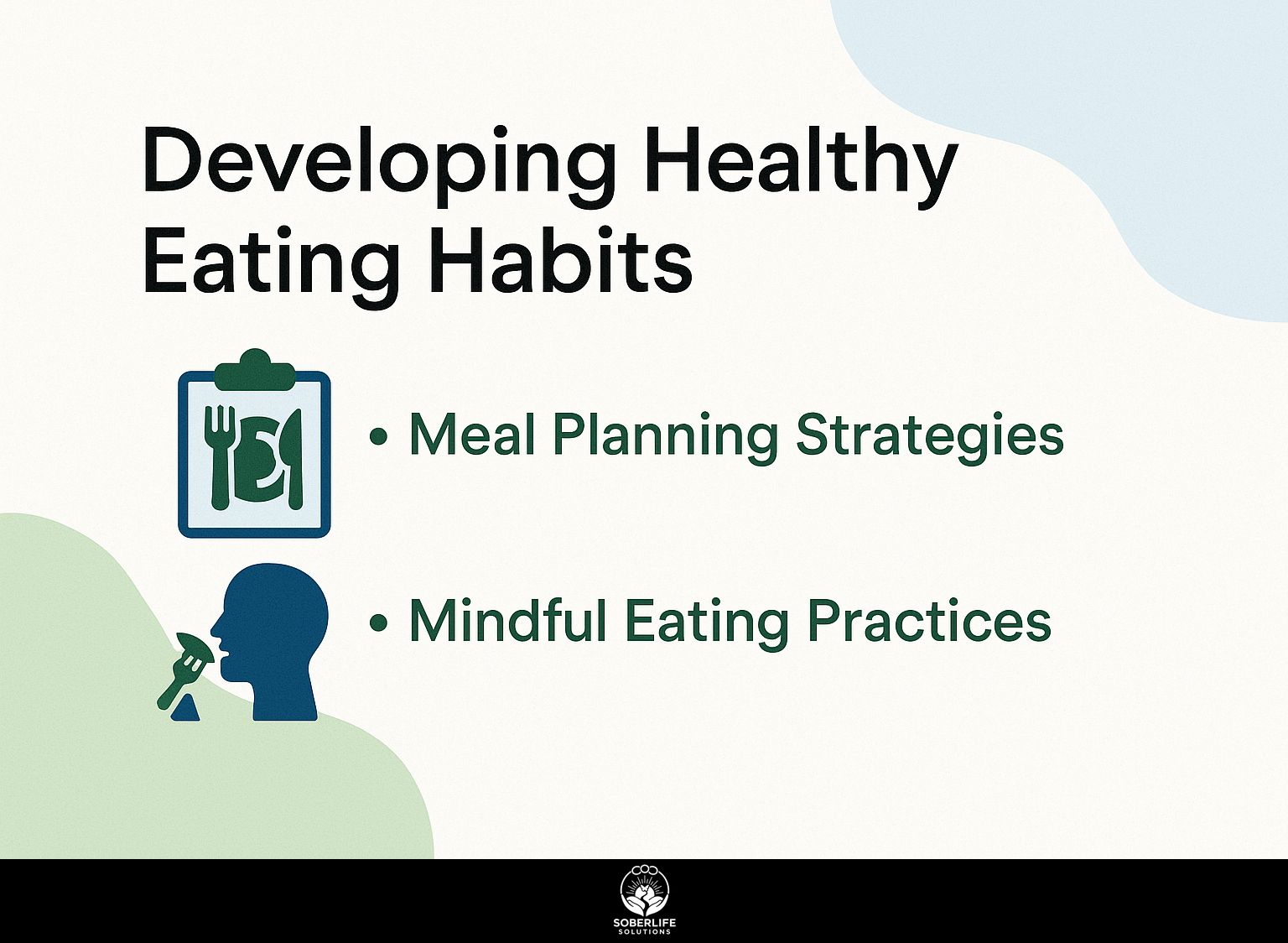
Forming good eating habits is important for recovery, aiding people in keeping balanced diets that promote general health and emotional steadiness.
Meal Planning Strategies
Planning meals effectively can increase the likelihood of maintaining a healthy diet by 50%, which is very useful for recovery.
To start, create a weekly meal template with tools like Mealime or Plan to Eat; these can simplify ingredient organization and recipe selection.
Include a variety of protein sources like lentils, chicken, and beans, alongside complex carbohydrates such as quinoa and sweet potatoes.
Cooking big meals on weekends can help you plan ahead.
For instance, a sample meal plan could feature quinoa salad with grilled chicken for lunch and lentil stew for dinner, promoting both balance and convenience throughout the week.
Mindful Eating Practices
Practicing mindful eating can drastically reduce binge eating episodes by up to 40%, allowing individuals to reconnect with their body’s hunger cues.
To add mindful eating to your routine, begin by chewing your food well and enjoying each taste. Aim for at least 20-30 chews per bite, engaging your senses fully.
Next, create a distraction-free environment during meals: turn off devices and focus solely on your food.
Use a hunger scale from 1 to 10 to assess your fullness level before eating, during, and after meals. This practice helps you become more aware of your body’s needs and encourages better eating habits.
Incorporating Physical Activity
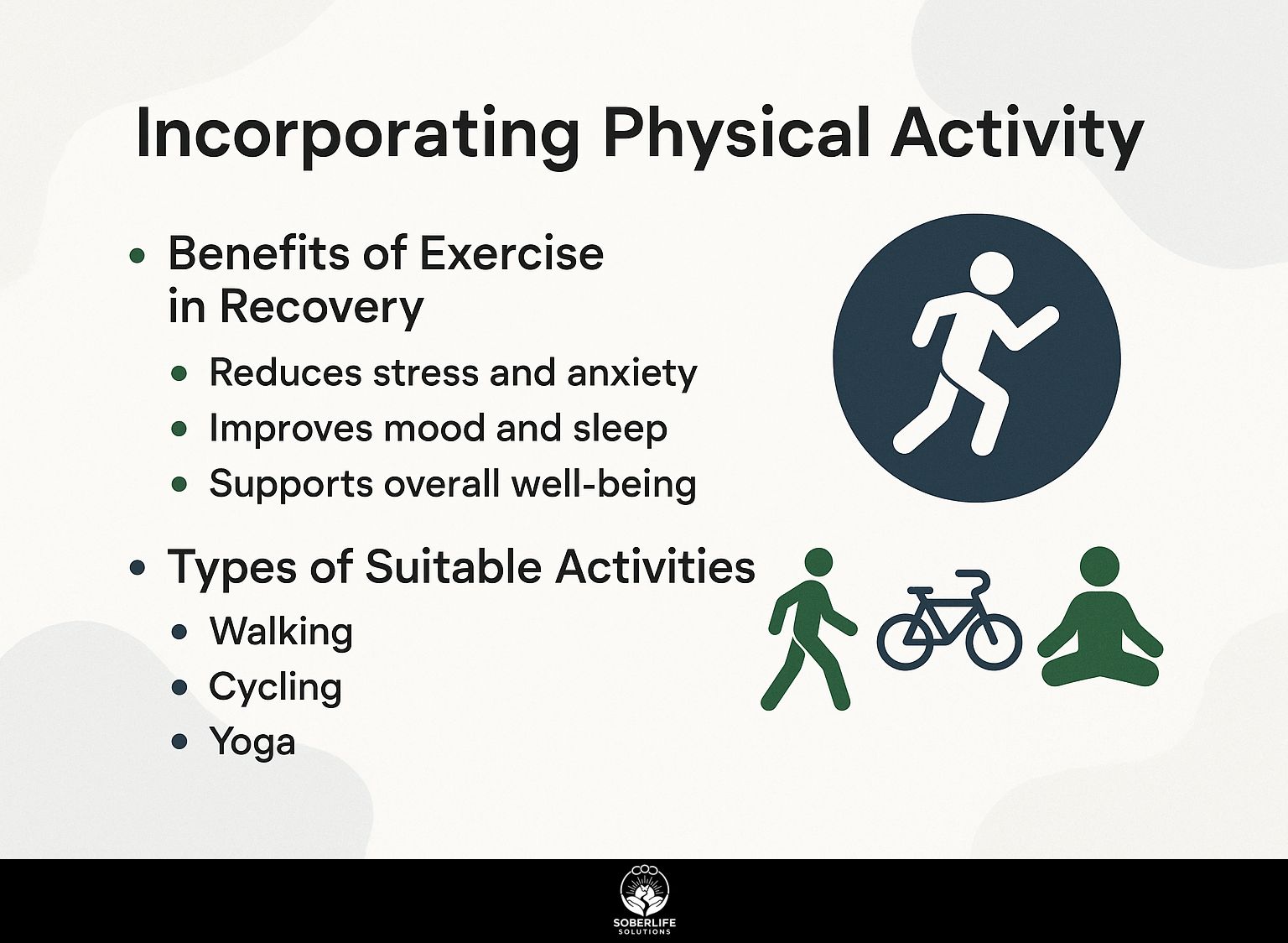
Exercise improves both physical health and mental well-being, helping with recovery. For an extensive analysis of this trend, our comprehensive guide on how to build a workout habit provides insights into integrating exercise into daily routines effectively.
Benefits of Exercise in Recovery
Regular exercise can increase recovery success rates by 30-50%, as it reduces stress and improves mood through the release of endorphins.
Incorporating exercise into your routine can be as simple as starting with a daily 30-minute walk. This moderate activity improves sleep quality and lifts your mood by encouraging the release of serotonin.
If you want to meet people, try joining fitness classes or sports teams. These environments encourage friendships and give extra motivation.
Using apps like MyFitnessPal or Strava to track your progress can help you stay accountable and focused, making it easier to keep these good habits in your daily routine.
Types of Suitable Activities
Doing activities like yoga, walking, and swimming can create a helpful setting for recovery, suitable for different fitness levels.
Yoga is particularly beneficial for stress relief and flexibility; consider local studios or online platforms like Yoga with Adriene for guided sessions.
Walking offers a low-impact cardiovascular option; apps like MapMyWalk can help track your distance and progress.
Swimming is a complete exercise for the entire body, perfect for people looking for a workout that is easy on the joints. Community pools often offer swimming classes, while YouTube channels such as Swim Life can help you improve your swimming skills.
Adding these activities can greatly improve your physical and mental health.
Building a Supportive Environment
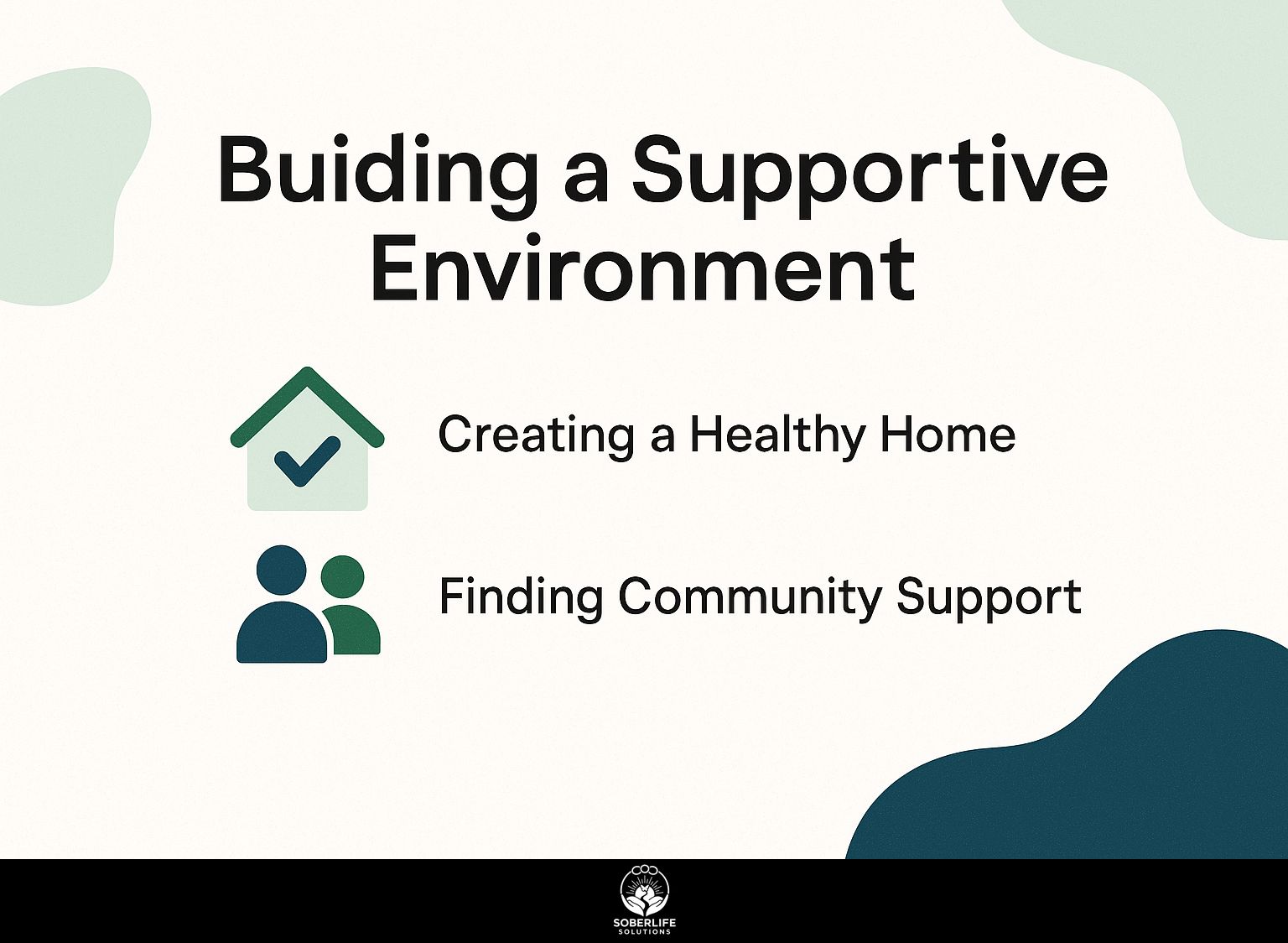
Creating a supportive environment is key to recovery, as a caring place can greatly affect a person’s path to lasting progress. If you’re interested, exploring group counseling dynamics and success rates can offer additional insights into how structured support systems contribute to recovery.
Creating a Healthy Home
A healthy home can help with recovery by minimizing triggers and encouraging good habits like preparing meals and exercising.
To create this environment, begin by removing substances that may trigger cravings or unwanted habits, like sugary snacks and processed foods.
Next, stock your pantry with nutritious foods-focus on fresh fruits, vegetables, whole grains, and lean proteins.
Designate a specific area in your home for physical activity, equipping it with essentials such as a yoga mat and some weights.
Use a checklist to track your progress and maintain steady effort; it can list tasks like planning meals and sticking to daily exercise routines.
Finding Community Support
Being part of recovery support groups can increase long-term recovery success rates by up to 70%, offering social ties and responsibility.
To find and engage with community support, consider joining both local and online groups.
Alcoholics Anonymous (AA) holds meetings where people gather in person, and SMART Recovery provides support through the internet. Going to events like wellness fairs helps you be seen and find resources.
Social media platforms like Facebook and Reddit have dedicated groups where individuals share experiences and support each other. Connecting with these communities can build long-lasting relationships, greatly expanding your support network.
Maintaining Long-Term Changes
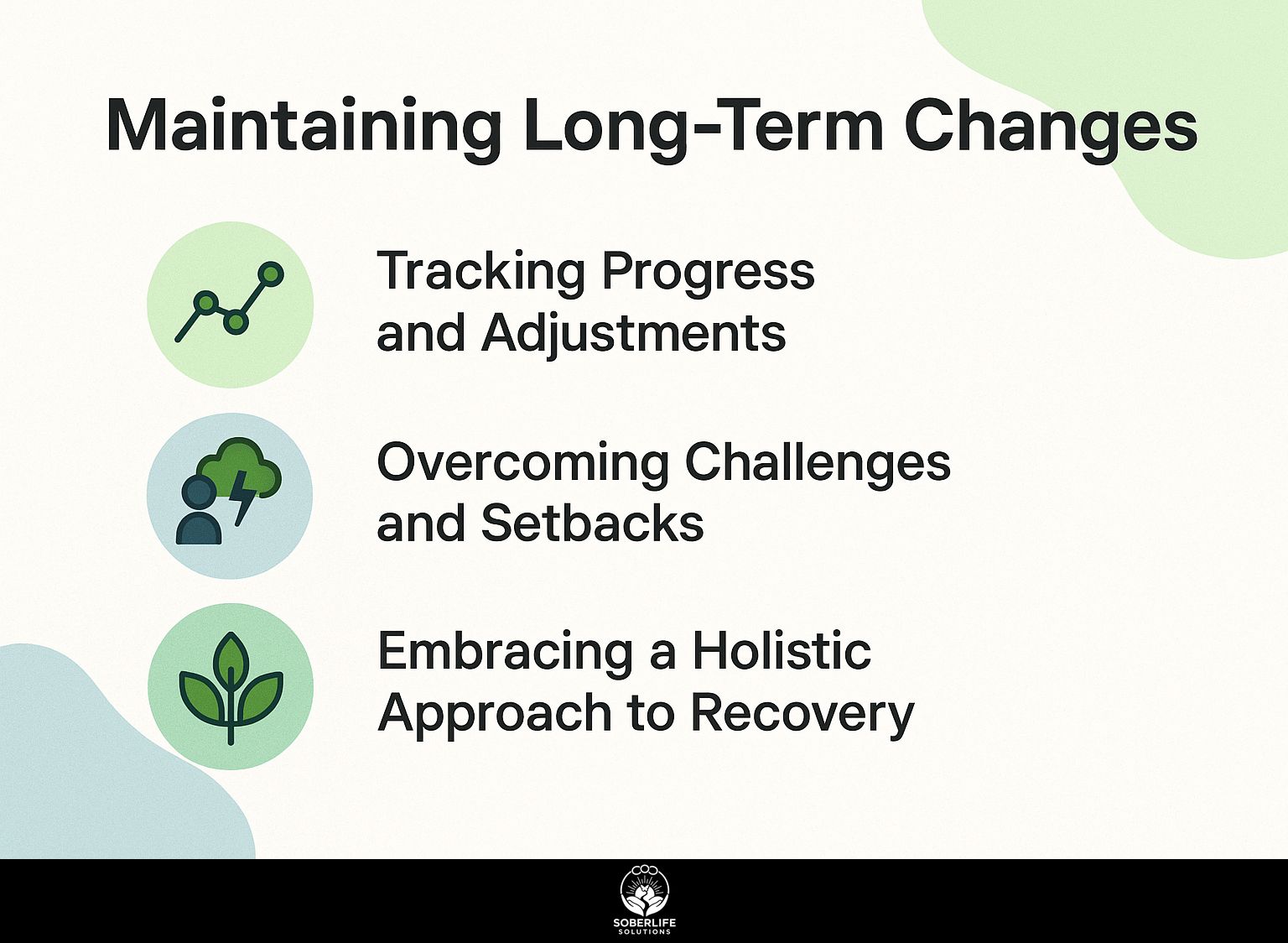
Keeping changes over time requires regular effort to track progress and adjust methods to deal with challenges during recovery. One effective strategy is implementing relapse prevention techniques, which focus on maintaining sobriety and tackling potential setbacks.
Tracking Progress and Adjustments
Using a tracking system can improve responsibility and increase awareness of eating and daily habits, which helps in reaching recovery goals.
To effectively track your progress, consider using a journaling app like MyFitnessPal to log daily meals and emotions.
Setting specific monthly goals-such as increasing vegetable intake or committing to 30 minutes of exercise at least four times a week-can provide clear benchmarks.
Schedule weekly reviews to assess what strategies are working. For example, if you notice improved energy levels on days you meet your water intake goal, make it a priority.
This repeated method lets you keep getting better throughout your recovery.
Overcoming Challenges and Setbacks
Dealing with frequent issues during recovery can build determination to stick with lifestyle adjustments.
To tackle emotional triggers, practice mindfulness techniques like meditation or journaling to understand your cravings better.
In social situations, establish a clear plan like bringing a sober friend or suggesting alternative activities that don’t involve substances.
To manage stress, include physical activities like yoga or exercise, which can help in reducing tension.
Getting help from a counselor or support group can also offer important community and responsibility as you face these challenges.
Consistently engaging in these practices will lead to stronger coping strategies over time.
Using a Complete Method for Recovery
Treating all parts of life helps people recover better by focusing on both body and mind health.
For a complete and thorough recovery, think about using these methods:
- Engage in regular physical activity, such as yoga or walking, which helps improve mood and fitness.
- Add mindfulness activities such as meditation to improve mental focus and lower stress.
- Eating a balanced diet with plenty of whole foods is important for both physical and mental health.
- Build strong social ties by joining support groups or talking to a counselor.
Gradually improving habits builds strength, so begin with minor adjustments for better health and consider consulting an expert for guidance.
Frequently Asked Questions
What is the importance of changing habits in recovery?
Changing habits during recovery is essential for keeping a healthy and balanced life. Habits play a big role in our daily routines and can greatly impact our physical, mental, and emotional well-being. By changing unhealthy habits and adopting new ones, individuals in recovery can improve their overall health and reduce the risk of relapse.
What are some common unhealthy habits to change in recovery?
Some common unhealthy habits to change in recovery include poor eating habits, excessive substance use, lack of physical activity, and negative thought patterns. These habits can lead to a decline in physical and mental health, hindering the recovery process. Changing these habits can greatly improve an individual’s quality of life and support long-term recovery.
How can I start changing my habits in recovery?
The first step in changing habits in recovery is to identify the unhealthy habits that need to be changed. You can do this by thinking about your feelings and talking to a therapist or joining a support group. From there, creating a plan and setting achievable goals can help individuals take small steps towards changing their habits and leading a healthier lifestyle.
Why is it important to focus on eating and lifestyle habits in recovery?
Food and lifestyle habits have a big impact on physical and mental health, and play an important role in recovery. By improving these habits, people can boost their overall health, lower the chance of relapse, and help their ongoing recovery process.
What are some healthy eating habits to adopt in recovery?
In recovery, it is important to focus on nourishing your body with healthy, whole foods. Some healthy eating habits to adopt include meal planning, eating balanced meals, and incorporating more fruits, vegetables, and lean proteins into your diet. It is also important to listen to your body’s hunger and fullness cues and practice mindful eating.
Can changing habits in recovery be challenging?
Yes, changing habits in recovery can be challenging. Habits are deeply ingrained in our daily routines and can be difficult to change. It is important to be patient with yourself and remember that change takes time. Getting help from a therapist, joining a support group, or talking to friends can simplify the process and lead to better results.

